Great binoculars for professional ornithologists and dedicated birders.
If you want to take a close-up look at a rare or beautiful bird, then you’ll need a pair of the best binoculars for birding. Such a tool can provide you the portability and functionality necessary to spot and observe all kinds of birds in a natural environment.
In the article below, you’ll find out what makes such binoculars so great, how to pick between different models and discover a list of 9 best options that the market currently has to offer.
Low magnification models don’t require a lot of focusing and provide improved stability, while stabilizing binoculars offer a top-notch image but are rather bulky and expensive.
The rubber cover offers nice protection against accidental collisions and a lot of roof-prism type of binoculars are also water-resistant. Most of the options featured below have a special coating on their lenses that enhances light transmission and provides a clearer picture.
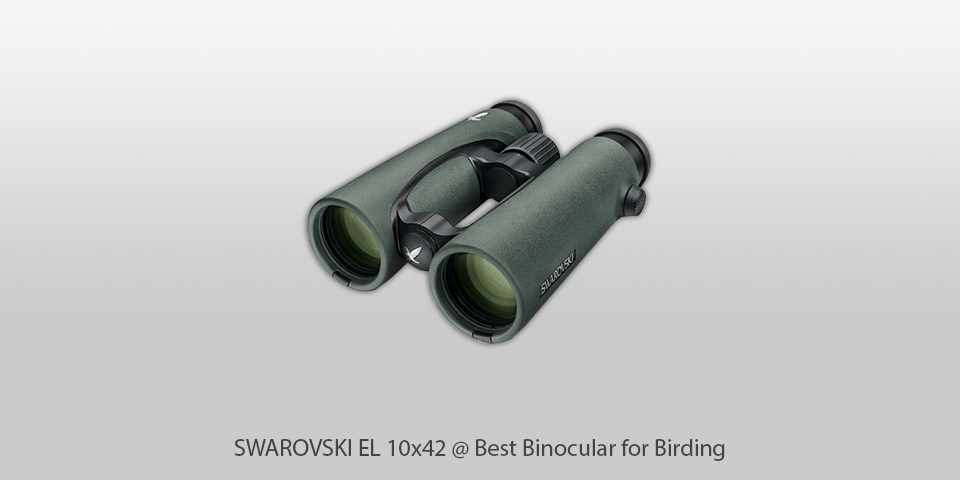
Magnification: 10 x | Objective diameter: 42 mm | Field of view at 1000m: 112 metrers | Closest focusing distance: 5 metres | Eye relief: 17.3 mm | Weight: 595 g
⊕ Color-saturated
⊕ Nice contrast in proper light
⊕ Easily adjustable neck strap
⊕ Best field of view
⊖ Loses sharpness at long range
The field flattener lenses allow this model to produce a nearly flat picture with incredible sharpness, meaning you’ll get to enjoy all of the details even if they’re located at the edge of the image.
Manufacturing binoculars that combine a broad field of view with edge-to-edge sharpness is a massive feat and Swarovski managed to do exactly that, producing binoculars that even eyeglass wearers can enjoy without any difficulties.
Another technical advancement introduced with this product is the fluoride-based HD lenses that are paired with state-of-the-art optical components to provide minimum color fringing and superior color fidelity.
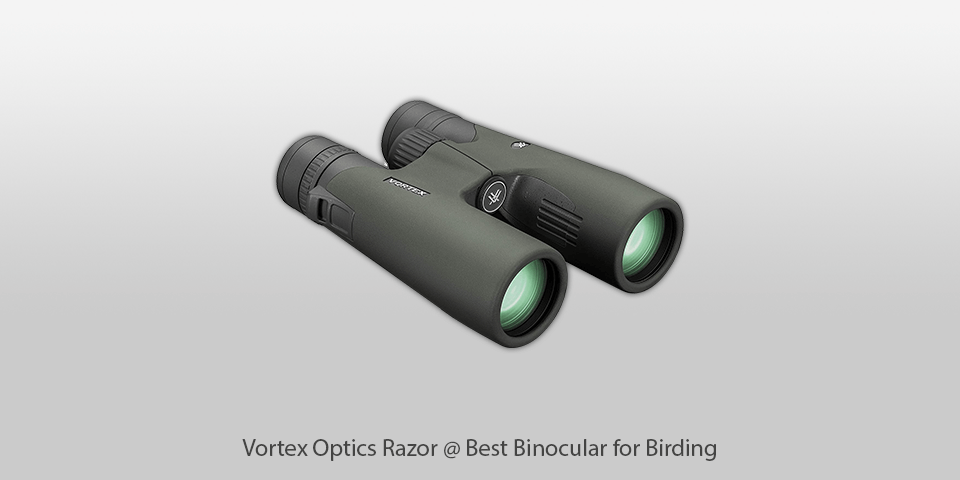
Magnification: 8 x | Objective diameter: 42 mm | Field of view at 1000m: 116 metres | Closest focusing distance: 2 metres | Eye relief: 15.5 mm | Weight: 823 g
⊕ Index-matched lenses
⊕ Magnesium chassis
⊕ Conveniently-placed controls
⊖ High price
You get state-of-the-art optics, an amazing resolution, vibrant colors, equally high sharpness on all image areas and efficient light transmission.
These birding binoculars also have a magnesium chassis that makes them more reliable without increasing their weight. The offered open hinge design provides terrific ergonomics and the rubberized cover ensures you get a firm, comfortable grip on the Razor.
The included right-eye diopter adjusts the focus of both barrels to your eyes while the convenient focusing wheel allows you to fine-tune the picture until it’s perfectly sharp. The twist-up eyecups feel comfortable against the skin and have adjustable eye relief.
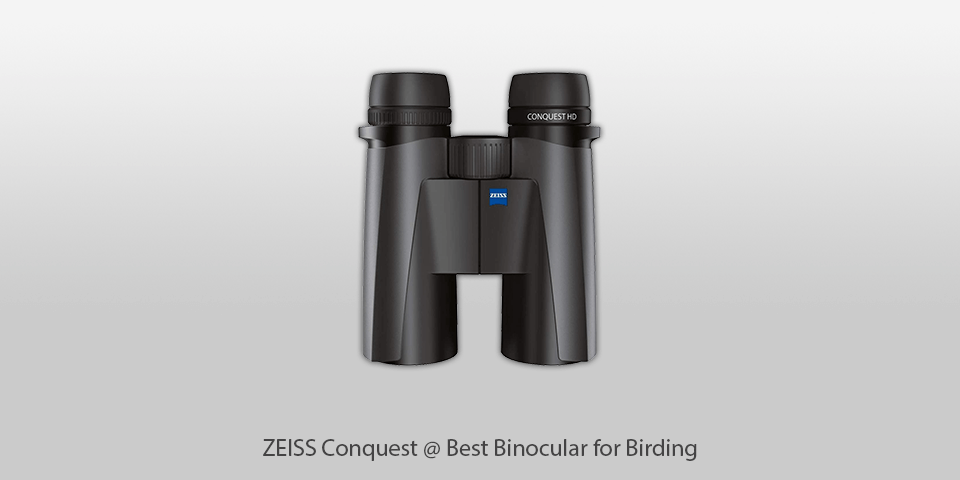
Magnification: 15 x | Objective diameter: 45 mm | Field of view at 1000m: 7.5 metres | Closest focusing distance: 3.5 metres| Eye relief: 18mm | Weight: 505 g
⊕ Lightweight and small
⊕ Comes with an HD lens
⊕ Ergonomic design
⊕ Objective lens consists of top-tier ED glass
⊖ Rather expensive
Conquest is often considered the best binoculars for birding due to the rotatable and lockable eyecups. This product is equally well suited for both regular users and eyeglass wearers.
Thanks to the innovative design of the eyecups, adjusting them is very simple and intuitive, as you simply have to rotate them and then lock them once you’ve found the optimal distance.
A thick layer of rubber protects the aluminum base while the lenses are covered with a weather-resistant coating. The roof prisms offer a minimalist design and combine durability and great performance.
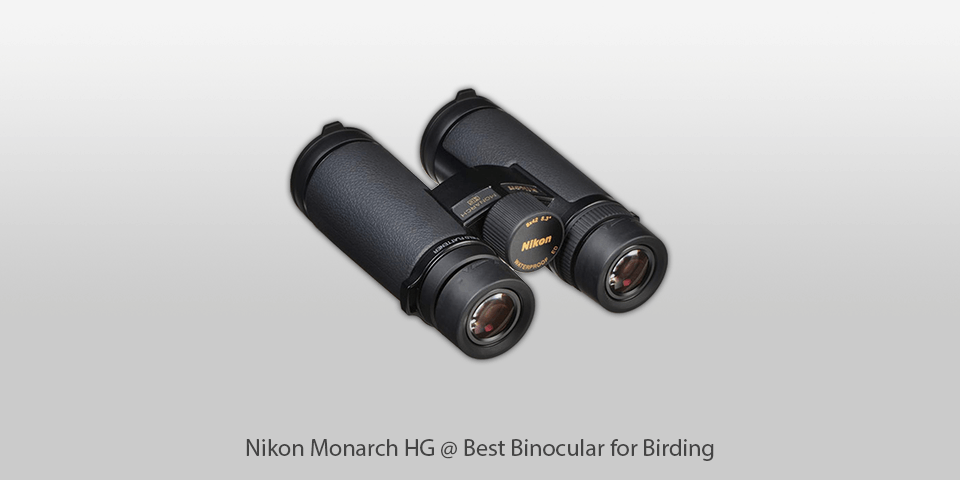
Magnification: 8 x | Objective diameter: 42 mm | Field of view at 1000m: 227 metres | Closest focusing distance: 2 metres| Eye relief: 17.8 mm | Weight: 482 g
⊕ Impressive field of view
⊕ ED glass lenses
⊕ Field Flattener lens system
⊖ High price
Nikon created the optics for these birdwatching binoculars using ED (Extra-low dispersion) glass and premium-grade multilayer coating which covers all the lenses and prisms and provides a bright, high-res picture.
The applied layers of anti-reflective coating help optimize light transmission, consequently improving the brightness and contrast levels achieved by the Monarch HG.
With 20 years of experience in producing optical equipment behind their backs, it’s no surprise that Nikon’s new flagship model offers everything you need to enjoy birdwatching like never before.
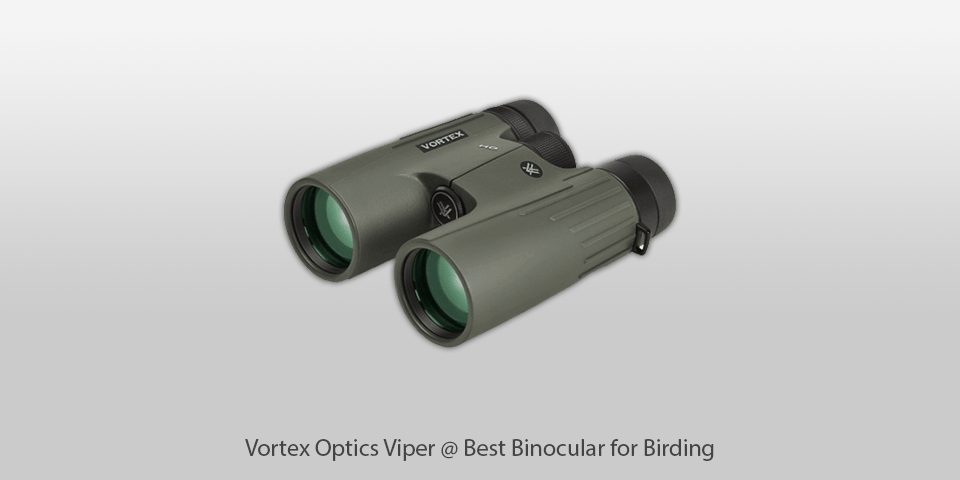
Magnification: 8x | Objective diameter: 42mm | Field of view at 1000m: 125 metres | Closest focusing distance: 2 metres | Eye relief: 50 mm | Weight: 286 g
⊕ Terrific material quality and ergonomics
⊕ Adjustable eyecups and IPD
⊕ Roof prism model
⊕ High-density optics
⊖ Doesn’t have a diopter scale
With a max magnification power of 8x and 42mm objective lenses, the Viper is a pair of premium, compact bird watching binoculars that you can always trust to provide some spectacular views. The chassis is protected with rubber, offers a firm grip, and the added thumb indents secure top-notch ergonomics.
The high-density optics allow you to enjoy a terrific resolution with an amazing edge to edge sharpness. XR anti-reflection lens coating provides high brightness even in poor lighting conditions.
The provided diopter can be locked and helps adjust the barrel's focus to your eyes. The eyecups feel nicely against the user’s eyes and the included customizable eye relief makes the Viper a terrific option for people, who wear glasses and would like to take up birdwatching.
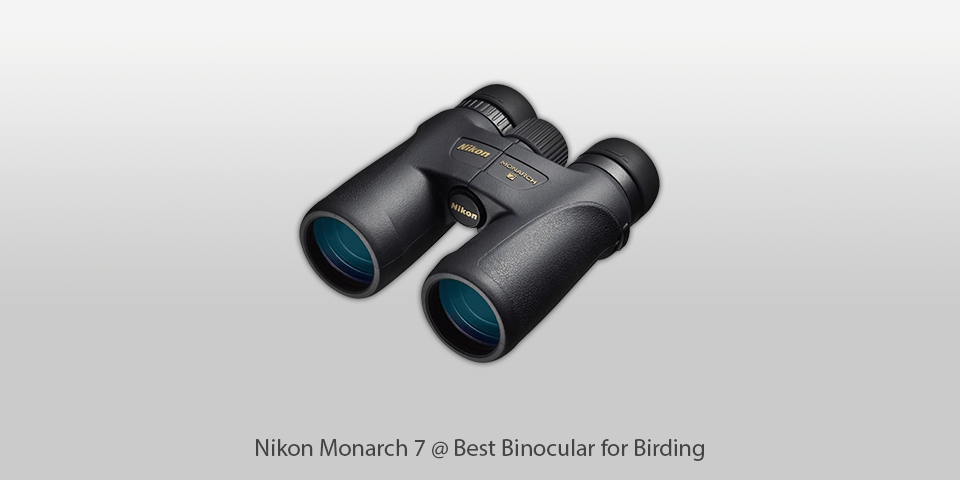
Magnification: 8x | Objective diameter: 42 mm | Field of view at 1000m: 107 metres | Closest focusing distance: 2 metres/ ft | Eye relief: 17.1mm | Weight: 455 g
⊕ Reliable build
⊕ Extremely convenient to use
⊕ Provides a crispy clear image
⊖ Might be too heavy for hiking
These Nikon binoculars for birding offer a terrific field of view that is extremely useful for quickly locating your subject and focusing on it. The Dielectric high-reflective Layered Prism coating covers all lenses and prism components to ensure a crisp picture with terrific color precision. The reliable rubber armor cover makes the Monarch 7 both durable and comfortable to hold regardless of the weather conditions.
The special glass used for these binoculars improves the brightness and color precision, while roof prisms and phase-correction allow you to enjoy a clear and highly-detailed image. The coating on the lenses also possesses anti-reflective properties, which is important for light transmission. Lastly, nitrogen-infused housing lets you enjoy a fog-proof and water-resistant experience.
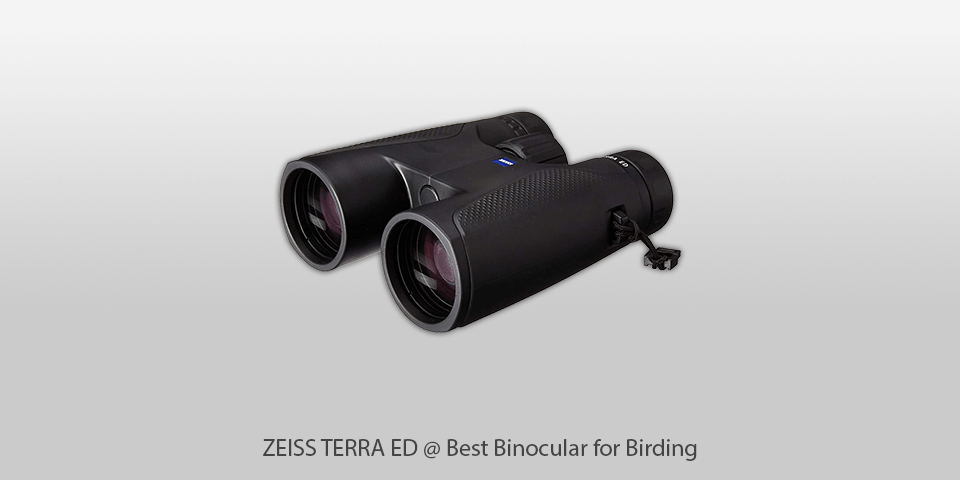
Magnification: 8x | Objective diameter: 42mm | Field of view at 1000m: 125 metres | Closest focusing distance: 1.6 metres | Eye relief: 16.9 mm | Weight: 1360 g
⊕ Small size
⊕ Easily fits into most bags
⊕ Comfortable to hold
⊖ Heavy
TERRA ED can be considered the best binoculars for bird watching due to the provided 8-times magnification, terrific field of view at 1000m-125m, and apparent field of view of 56 degrees. The weatherproofing parameters of the binoculars allow you to use them in temperatures between -4 and 145°F and the water-resistant body guarantees TERRA isn’t afraid of any rains on storms.
Other than birdwatching, the small body size and big lens diameter make these binoculars a great option for observing wildlife, traveling, hiking, and various outdoor activities. TERRA combines top-notch optics and hydrophobic multilayer coating to ensure you can see every single detail of your subjects.
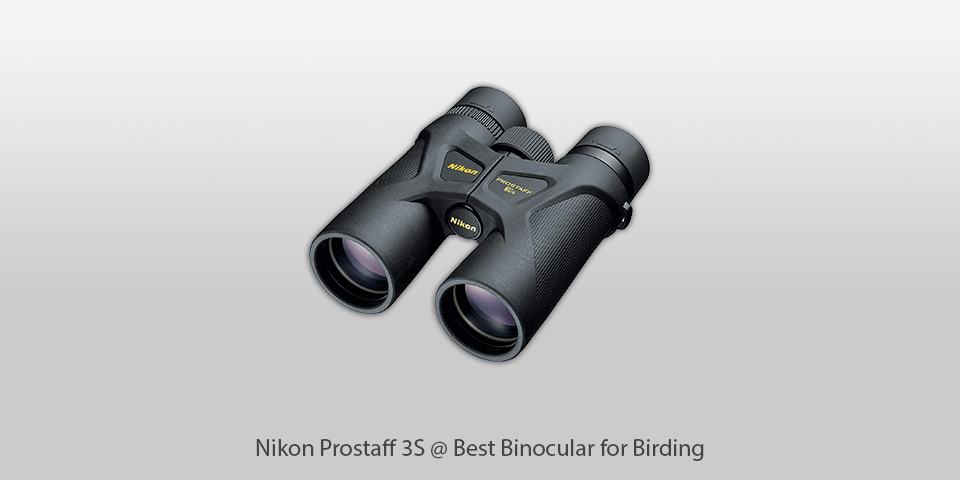
Magnification: 10x | Objective diameter: 42mm | Field of view at 1000m: 126 metres | Closest focusing distance: 3 metres | Eye relief: 15.7mm | Weight: 575 g
⊕ Lightweight design
⊕ Offers an extended eye relief
⊕ Terrific field of view
⊖ No phase-correction coating on the roof prism
⊖ Would have benefited from a tripod mount
These binoculars for bird watching come with optics made of eco-friendly glass that doesn’t contain any lead or arsenic. The multilayer coating ensures efficient light transmission across the whole visible spectrum and is applied to all lens and prism components responsible for transmitting light.
The lightweight compact body of the Prostaff 3S makes it extremely comfortable to hold the binoculars for hours on end.
The rotate-and-slide rubberized eyecups enable you to set the eye-relief to the exact distance you need, allowing you to enjoy a broader field of view and an increased level of comfort. Akin to other options on this list, Prostaff is Nitrogen filled and has O-Ring sealing that provides water- and fog-resistant performance.
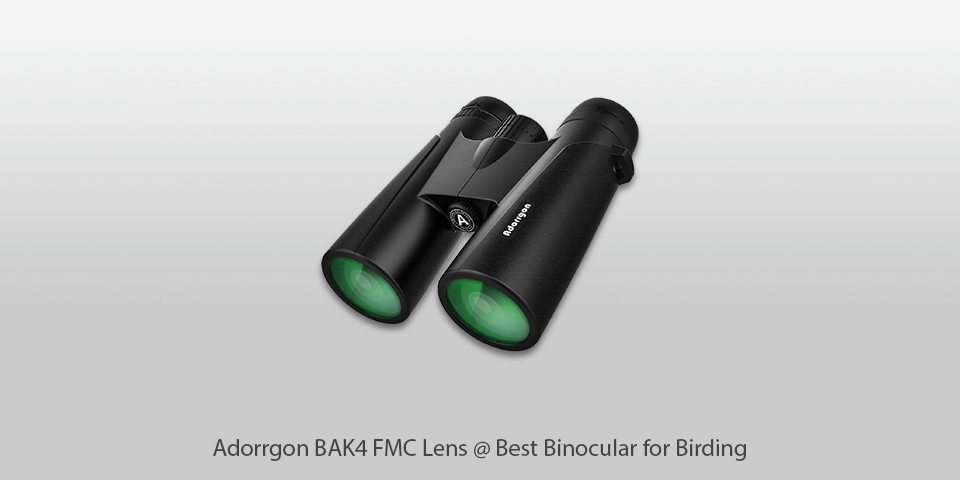
Magnification: 12x | Objective diameter: 42 mm | Field of view at 1000m: 112 metres | Closest focusing distance: 3.5 metres/ ft | Eye relief: 18 mm | Weight: 455 g
⊕ Impressive image quality
⊕ HD Vision thanks to high-quality lenses
⊕ Perfect for low light conditions
⊖ None
This model comes with 18mm eyepiece. The image size is 2.25 times larger than with average binoculars as the device makes most of the 12x magnification and produces the high-clarity visuals.
The 16.5mm BAK4 prism and multi-coated lens add to the unprecedented quality and perfect brightness. If you are looking for the best binoculars for birding, note that this pair can be used for other leisure activities as well.
While they deliver great results under poor light conditions, you will need to purchase a night vision device if you want to go bird watching at night. This piece of equipment is a nice option for hunters and music fans as well. You can easily store it in a carrying case that comes with it.
| Image | Name | Features | |
|---|---|---|---|
 |
SWAROVSKI EL 10x42
Our choice |
CHECK PRICE → | |
 |
Vortex Optics Razor
High Quality |
CHECK PRICE → | |
 |
ZEISS Conquest
Stylish |
CHECK PRICE → |
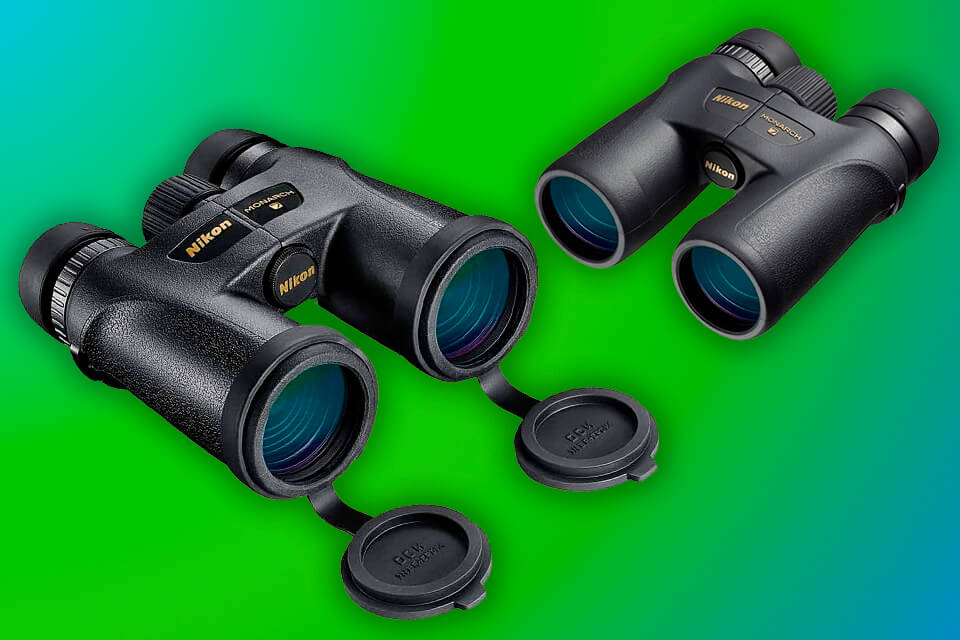
If you can’t choose between 8x and 10x magnification, try testing different pairs of binoculars to decide which option suits you best. Most often, birders go for 10x as it allows zooming in on distant subjects easily. However, such binoculars have a narrow field of view and deliver worse performance under poor light conditions. The overall quality might also suffer if you use the binoculars in a hand-held mode. While 8x devices have worse magnification, your field of view will be wider thus allowing you to detect birds more quickly.
The first thing you notice when you start picking binoculars is that they come with lenses of different sizes. The lens diameter affects the image quality and the light-gathering capability of your device. However, if your piece of gear boasts large lenses, it will be heavier and bulkier. The best binoculars for bird watching with large magnification are less portable so it might be inconvenient to carry them around for long.
Magnification and lens diameter define if your pair of binoculars can gather more light and deliver decent image quality even on cloudy days. Two pieces of equipment with identical magnification capabilities might deliver different results. For instance, if you can’t decide between 10×25 and 10×32 binoculars, note that the latter allows you to get a brighter image. Similarly, if the lens diameter is the same but magnification differs, the device with the smaller magnifying power will deliver a brighter image.
If you are curious about night birds and often go birding at dusk or dawn, you will enjoy using the best birding binoculars with a larger lens diameter.
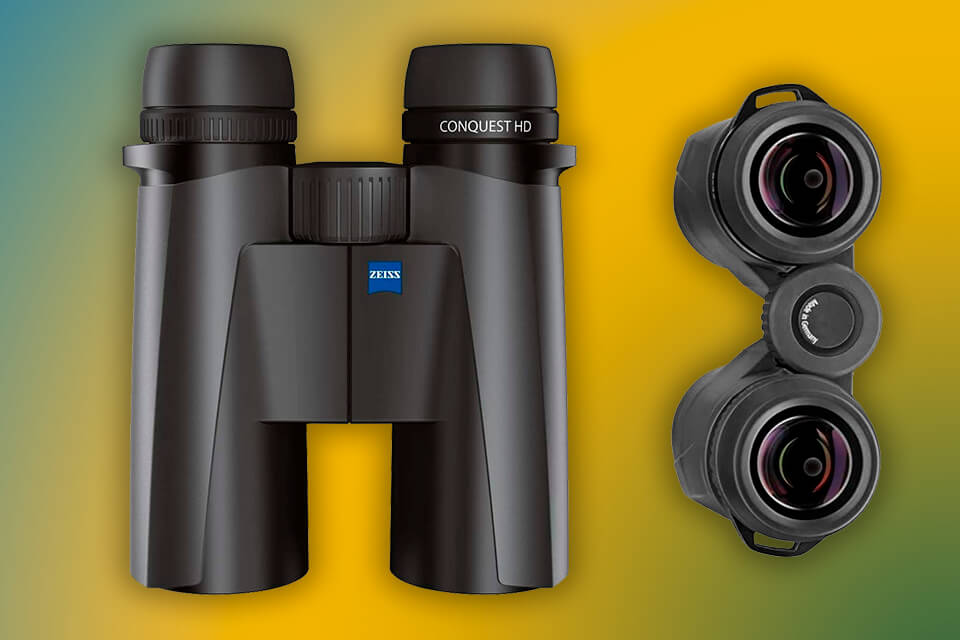
When you read a description of any pair of binoculars, you will notice the numbers describing their specs. For example, you might see 8x32 followed by one or several letters, such as B or GA. The first number stands for magnification powers and the objective lens diameter indicated in millimeters. On average, binoculars offer between 7x and 10x magnification but there are more advanced options as well. If you choose the best binoculars for birding with large lenses, the image will be much brighter even if you go birding in the evening.
It is the lens diameter that defines the size of your binoculars. If there is a B letter after the number, it means that this piece of equipment comes with rubber eye-cups, which is extremely convenient for people who wear spectacles. It accounts for a wider image without a field view loss. GA or RA indicates that your pair of binoculars comes with extra protection and has a rubber-covered body.
If you need to know the width of the field of view of your best binoculars for bird watching, it is indicated either in degrees (6.5°) or meters (140m at 1,000m). 1° equals to 17m at the 1000-meter distance.
Make sure not to base your decision solely on these numbers, though. A pair of 8x32 binoculars with low lens quality might deliver worse brightness and sharpness than other pieces of equipment.
10x is the optimal magnification. If it’s higher, you will have problems with the minimum focus distance. The field of view will be quite narrow as well. Most people use the best binoculars for bird watching that allow for the magnification between 7x and 10x. Until recently, 8x was the most widespread option.
If you need to buy a pair of binoculars that works well in the evening or at dawn but worry that a distance from your subject might be too long, the 10x50 device mounted on a tripod is a good choice. Some birders have several pairs of binoculars, with more portable models and devices with better light-gathering capabilities among them. For instance, the 8x30 Zeiss West doesn’t weigh too much as can be stored easily.
Magnifying power is one of the most important parameters. It’s better to choose the binoculars for bird watching with a magnification ranging from 8x to 10x. The latter is better for long distances but your field of view will be narrower and an image might look darker. The signs of hand-shake will be more noticeable as well.
For casual use, it’s better to purchase a pair of binoculars with magnification ranging from 7x to 10x. Is will also be suitable for most bird watching activities as such pieces of equipment have decent stabilization options.

 Rating
Rating